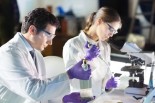BRCA1 and BRCA2 are human genes that produce tumor suppressor proteins.
These proteins help repair damaged DNA and play a role in ensuring the stability of the cell’s genetic material.
When either of these genes is mutated or altered in such a way that its protein product either is not made or does not function correctly, DNA damage may not be repaired properly.
As a result, cells are more likely to develop additional genetic alterations that can lead to cancer.
However, misconceptions about how these mutations are passed down — and about what the tests themselves mean — can get in the way of sound decision-making.
When either of these genes is mutated or altered in such a way that its protein product either is not made or does not function correctly, DNA damage may not be repaired properly.
As a result, cells are more likely to develop additional genetic alterations that can lead to cancer.
However, misconceptions about how these mutations are passed down — and about what the tests themselves mean — can get in the way of sound decision-making.
Listen in as Heather Sulzbach, MS, ANP-C, AOCN-P, joins Dr. Susanne to help clear the air about a few common myths concerning BRCA1 and BRCA2.

 Heather L. Sulzbach, recipient of Long Island Jewish Medical Center’s 2005 Nursing Excellence Award in Clinical Practice, is an advanced oncology Nurse Practitioner at NYU Langone Arena Oncology, where she has provided outpatient care for those living with cancer for more than a decade. In this role, she provides ongoing treatment education to patients and families to help them understand their diagnoses and treatment options, and acts as clinical preceptor to new staff and students. Sulzbach also works closely with those living with metastatic breast cancer and their families to provide ongoing disease and symptom management support. Sulzbach also participates in clinical trials as a sub-investigator, grading drug toxicities and adjusting patient doses, as well as ensuring that the studies adhere to good clinical practice guidelines. Sulzbach is also an Adjunct Clinical Instructor at Nassau Community College.
Heather L. Sulzbach, recipient of Long Island Jewish Medical Center’s 2005 Nursing Excellence Award in Clinical Practice, is an advanced oncology Nurse Practitioner at NYU Langone Arena Oncology, where she has provided outpatient care for those living with cancer for more than a decade. In this role, she provides ongoing treatment education to patients and families to help them understand their diagnoses and treatment options, and acts as clinical preceptor to new staff and students. Sulzbach also works closely with those living with metastatic breast cancer and their families to provide ongoing disease and symptom management support. Sulzbach also participates in clinical trials as a sub-investigator, grading drug toxicities and adjusting patient doses, as well as ensuring that the studies adhere to good clinical practice guidelines. Sulzbach is also an Adjunct Clinical Instructor at Nassau Community College.